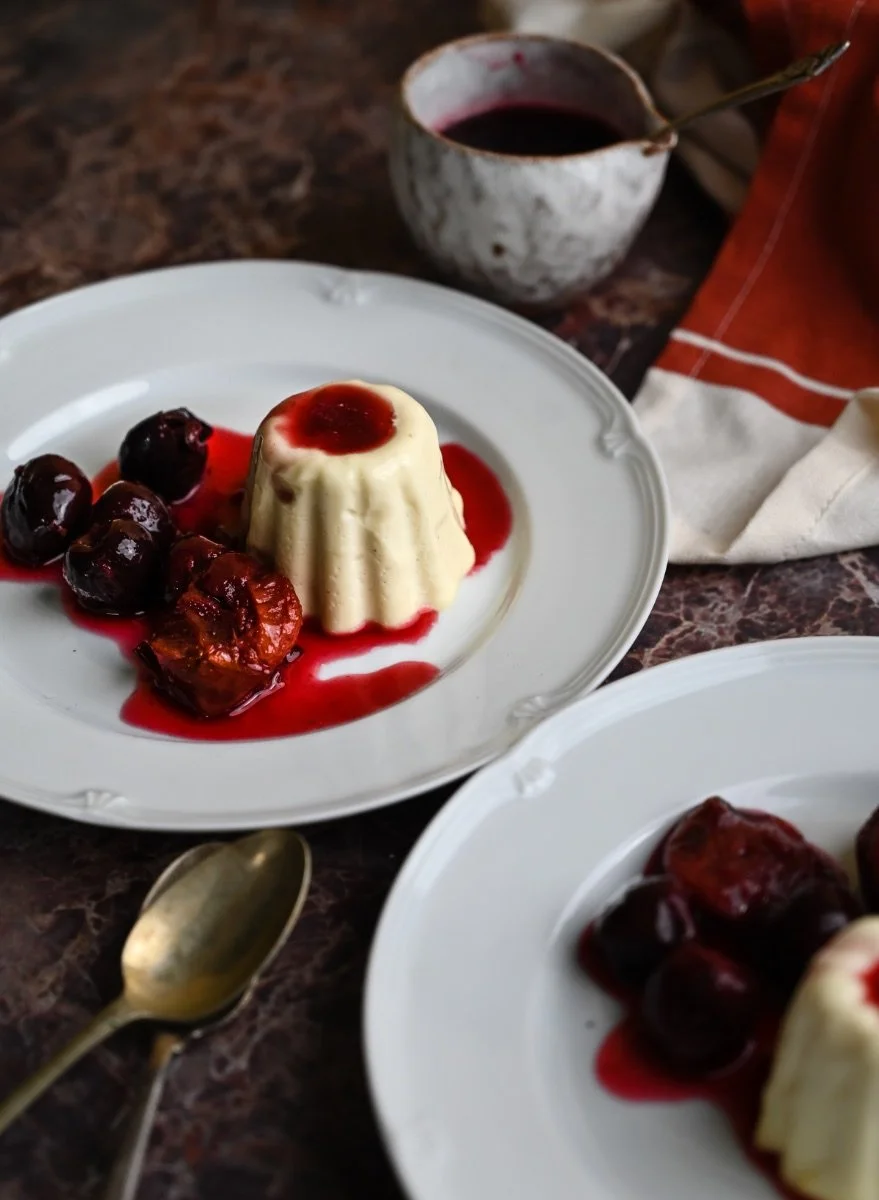Fig Leaf Panna Cotta with Roasted Stone Fruit
Fig leaves add a subtle floral, coconut-like flavour to this panna cotta, giving it a distinctive aroma that pairs beautifully with roasted stone fruit. The cream is infused slowly to capture the leaf’s fragrance, then set into a silky, softly trembling dessert. The roasted plums, cherries or nectarines bring just enough acidity to balance the richness, making this an ideal summer pudding that can be prepared a day ahead.

Fig Leaf Panna Cotta with Roasted Stone Fruit
A silky panna cotta infused with fig leaves for a delicate floral note, served with roasted stone fruit in red wine syrup. A light, elegant summer dessert that’s easy to prepare ahead.
Ingredients
- 600ml double cream
- 300ml whole milk
- 90g caster sugar
- ½ tsp vanilla paste
- 8 fresh young fig leaves, cleaned
- 7 small sheets leaf gelatine (I used Dr Oetker)
- 700g mixed stone fruit (plums, nectarines, cherries, etc.)
- 50g brown sugar
- 200ml red wine
- 2 star anise
- Pinch of salt
- 1 tbsp butter
- Toasted chopped or flaked almonds, to serve
Instructions
- Start the panna cotta a day before serving. In a large pan combine the cream, milk, sugar and vanilla, and heat to just below scalding point, around 70°C, when small bubbles appear around the edges. Remove from the heat, stir in the fig leaves, cover, and leave to infuse for until the cream has completely cooled, at least 1 hour but up to 6.
- Strain through a sieve, pressing gently on the leaves to extract the liquid. Return the cream to the pan and warm gently to around 60°C – hot enough to melt the gelatine but not higher, as gelatine loses strength at higher temperatures and cream can scorch. Soak the gelatine leaves in a bowl of cold water to soften, around 2 minutes, then squeeze out the excess water and stir them into the warm cream until fully dissolved. Pour the mixture into your chosen moulds and refrigerate until set, about 6 hours or overnight.
- Preheat the oven to 160°C. Halve or quarter the stone fruit and remove the stones. In a large roasting dish combine the wine, sugar, salt, star anise and butter, then add the fruit. Roast for 20 minutes, until the fruit is just softened but not collapsing. Lift the fruit out of the syrup and reserve the liquid to drizzle over.
- To serve, turn out the panna cotta onto plates. If they don’t release easily you can dip the mould briefly in hot water or use a blowtorch, to loosen the edges. Arrange the roasted fruit around the panna cotta, spoon over the syrup, and scatter with toasted chopped or flaked almonds.
Nutrition Facts
Calories
493Fat
38 gCarbs
32 gSugar
30 gProtein
5 gApproximate values per serving
Ingredients and sourcing tips
Fig leaves: Young fig leaves have a natural coconut and vanilla scent that intensifies when heated. Avoid older leaves, which can be tough and bitter. Pick only from unsprayed trees.
Fruit: Use a mix of ripe plums, cherries and nectarines for contrast in texture and colour. Slightly underripe fruit will hold its shape better when roasted.
Substitutes and dietary swaps
Fig leaves: If fresh fig leaves aren’t available, it will still be delicious with just classic vanilla or you could add some unsweetened coconut flakes to the warm milk and strain through a fine sieve when fully infused.
Vegetarian option: Use 1½ teaspoons agar agar powder instead of gelatine, following packet instructions carefully.
Alcohol-free option: Replace the red wine with pomegranate or grape juice for a non-alcoholic variation that still gives depth to the syrup.
Kitchen notes
Infusion time: Infuse the cream for several hours to draw out the fig leaf flavour fully. A short infusion gives a lighter, milder result.
Setting: Never boil the mixture once the gelatine has been added or it won’t set properly.
Syrup: If the syrup from the roasted fruit feels thin, you can reduce it in a small pan to concentrate the flavour and thicken the texture before serving.
Unmoulding: The panna cotta will release cleanly after a quick dip of the mould in warm water or a brief pass with a blowtorch around the edge, if using metal moulds.
Serving suggestions
Serve with toasted almonds or a thin almond biscuit for crunch. A drizzle of honey complements tart fruit beautifully.




